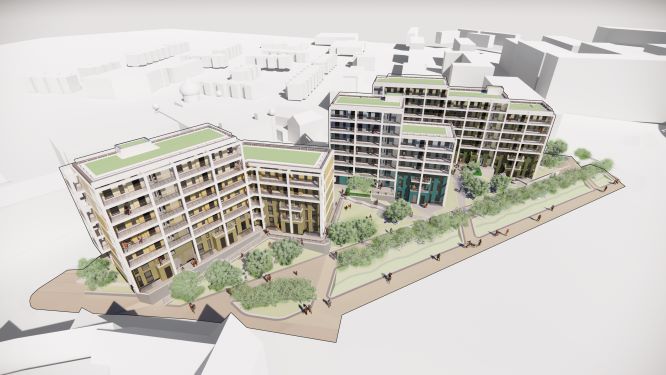A ground-breaking new vision for affordable homes to suit all generations has won planning permission to go ahead on Newcastle Helix, a 24-acre innovation district in Newcastle.
The ‘Future Homes’ project will build a community of 66 homes on a site on Buckingham Street within easy walking distance of the city centre’s shops, cafes and restaurants.
The project involves developing three buildings, each with six to eight storeys, and the concept involves efficient construction using modular steel facades, with extensive communal landscaping and green roofs.
The Future Homes Alliance (FHA) is a Community Interest Company formed by Newcastle University, Ryder Architecture, Zero Carbon Futures, the Elders Council, the Sustainable Communities Initiative, and the Innovation Super Network. The FHA is working in partnership with Newcastle City Council and its development agent Karbon Homes.
The partners have set out to create an exemplar of sustainable urban housing, with flexible living space to suit residents’ changing needs.
Homes will feature innovative concepts such as moveable partitions, so rooms and layout can be configured to suit the changing needs of different households.
Newcastle Helix stands on the western edge of Newcastle city centre, and is already home to a collection of striking looking and innovative buildings gathered at the eastern side of the site.
Now Future Homes will be built on the far western corner of the site, close to Westgate Road.
The plans aim to maximise the buildings’ solar aspect, with all homes featuring floor to ceiling south facing windows, and to provide high quality private and semi-public spaces.
The design has been developed in collaboration with Newcastle Helix and their masterplanning team. The partners worked together for over two years to develop a substantial base of research led by an extensive period of consultation with the local community, to agree proposals ready to be presented to city planners.
The buildings will all benefit from a range of communal facilities including gardens, mini-allotments, and secure cycle storage – all aimed at making the homes as sustainable and inexpensive to run as possible.
The concept of Future Homes was created to help tackle issues which the country’s existing homes do not properly address.
- By 2040, one in seven people in the UK will be over 75
- 25% of young people aged under 35 have to live with their parents
- 4.5m people in the UK are in fuel poverty
- Air pollution costs the UK economy £54bn per year and causes 680 deaths per year in the North East
- Cold, damp housing leads to a £864m spend for the NHS
- The NHS spends £435m per year on falls related injuries, most of which happen within the home.
The intention is for up to five ‘demonstrator’ homes to be used by industrial partners as test beds for innovative products, trialling a range of technologies, to enable data to be collected which may lead to wider adoption in housebuilding elsewhere.
The homes will all be affordable, and will be a mixture of social rent and Rent to Buy, giving opportunities to all sections of the community in Newcastle to live in the new development.
Due to its city centre location, the development is very well served by public transport. The site itself will provide up to 10 parking spaces including two disabled bays and two bays dedicated to car sharing schemes, while every home will have secure space to store bicycles.
The Future Homes project will form just part of the residential element of the Helix site, which in total will deliver just under 400 homes by 2025.
Professor Rose Gilroy from Newcastle University, founder and chair of the Future Homes Alliance, said: “From a commitment in 2016 to work together and develop an innovative housing response to demographic change and sustainability , the Future Homes Alliance has worked collaboratively to demonstrate that there can be innovation and creative design in affordable housing. This Is a proud day for us and our partners.”
Ged Walsh, director of development at Karbon Homes, said: “This development presents Karbon with a fantastic opportunity to explore new ways of providing homes. We’re delighted to have worked successfully with our Future Homes Alliance partners to win planning approval, and can’t wait to see the project start to become a reality on site early next year.”
Philip Miller, project architect at Ryder, said, “The Future Homes development is the embodiment of a collaborative and responsive design process where the needs and aspirations of a wide stakeholder base have helped to form the project. The scheme puts the quality of life of its residents at the forefront and enables their homes to change as they do, in a way which is sustainable and affordable.”
Councillor Ged Bell, cabinet member for employment and culture at Newcastle City Council said:
“This is another huge milestone in the Newcastle Helix story and further enhances our city centre as a place that is open and accessible to all; a vibrant, modern city centre where everyone can live, work and enjoy.
“This project is a perfect example of how the eco-system at Newcastle Helix is supporting the creation of new, innovative products and services and I look forward to seeing how the developments can help transform the way we all live, improve our health and become more sustainable.
“In these challenging times these plans will support jobs across Newcastle and create the modern, sustainable homes of the future that reflects our ambition to be a Digital by Design city.
“We want people to live longer, healthier and smarter lives and I am proud that Newcastle Helix is a test bed for innovative new products like this.
“Newcastle Helix has a global reputation as a place for business, world leading research and innovation. It will now be a place you can live well.”
Photo Credit: Ryder Architecture



